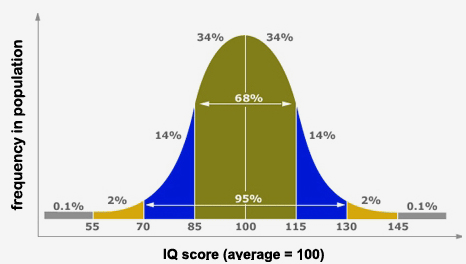What makes you smart?
While people have different cognitive strengths and weaknesses (e.g. language, music, math, visual, arts, sciences), correlations between them show us there is a common factor to all of these called ‘general intelligence’ or ‘G‘. G is a measure of how smart you are.
G can be defined as:
Your ability to reason, problem solve, decide, learn & act successfully in the pursuit of your valued goals.
Smarter people also have more attentional focus and processing capacity.
How do you get smarter for a higher IQ?
A critical insight from research over the past decade is that IQ is not a fixed, genetically determined attribute. Someone’s score on the bell curve is not set in stone genetically. Over time – weeks, months or years – an IQ level can change substantially.
Increasing intelligence is possible after all …with more training leading to greater gains …across the spectrum of abilities. …Almost 40 years ago, Jensen claimed that, when all is said and done, there is not much one can do to raise people’s IQs. Jaeggi and her colleagues have made an important contribution… by showing that intelligence is trainable to a significant and meaningful degree. Robert Sternberg, Professor of Cognitive Psychology, Indiana University
Far-reaching advances in cognitive psychology and cognitive neuroscience over the past decade have identified a close link between frontal lobe ‘working memory’ circuitry, and fronto-parietal problem solving and reasoning circuitry – core elements of IQ. Our working memory is used for holding information in mind (images, concepts, language, numbers) for brief periods while engaging in active, goal-focused thinking or comprehension, while screening out distracting information. Working memory has a limited capacity, and the bigger that capacity the more the cognitive ‘RAM’ power a person has for processing information – to make connections, generate alternatives, and grasp relationships. This brainpower lies at the core of being smart. If super brain Eddie Morra in Limitless changed one thing in his brain, it was his working memory circuitry!
IQ training software has now been developed for selectively targeting working memory circuitry, resulting in long term neuroplasticity changes increasing short term memory capacity, problem solving ability, self-control and overall IQ. This software is based on a training exercise called the n-back.
A review published this year on the effectiveness of n-back working memory training by a grad school colleague, Dr Jason Chein, concludes:
core working memory training studies seem to produce far-reaching transfer effects, likely because they target domain-general mechanisms of working memory. The results of individual studies encourage optimism regarding the value of working memory training as a tool for general cognitive enhancement.
In choosing an n-back working memory training application, ensure that you have a version the incorporates interference control training. Recent research (article 1, article 2) show that the link between intelligence and working memory is specifically in interference control – the ability to filter out distracting information that attracts your attention. Almost all n-back training programs on the market do not incorporate this feature. Avoid them.

IQ Mindware’s n-back application i3 Mindware is explicitly based on interference control. In addition, it benefits from the expertise of psychometricians working on the factors underlying performance on IQ and aptitude tests, enabling targeted training of the underlying factors of IQ – including visual-spatial, verbal and quantitative intelligence. Brain Workshop also has an interference control feature, although this feature is hard to find among its options.
Our i3 Mindware brain training application has been developed by cognitive neuroscientists and are guaranteed to increase your IQ 10-20 points – in 20 days, 20 minutes per day.
How smart are you? The IQ bell curve
How smart you are can be measured by IQ tests. Standardized IQ tests like the Raven’s Advanced Matrices test or the WAIS-IV are the most consistent and accurate type of psychometric test that scientists have devised. They are a good measure of general intelligence or G.
IQ tests are standardized meaning that scores can be ranked on an IQ bell curve. If you know your score, you know how you compare to other’s scores.
IQ tests are designed so that their scores have a ‘bell curve’ distribution in the general population with an average of 100. This curve has a peak in the middle where most people score and tapering ends where only a few people score.
.
Nearly 70% of the population score between 85 and 115. A very small percentage of the population (about 0.1% or 1 in 1000) have scores less than 55 or greater than 145.
Knowing where you are on the IQ bell curve indicates how smart you are. It’s not a foolproof measure, but it generally gives an accurate estimate of how smart you are.
What is an average IQ?
IQ tests are designed so that the average (mean) IQ score in the general population is 100.
An ‘average IQ score’ or ‘normal IQ score’ can be defined as a score between 85 and 115 – that is 70% of the population.
What is a high IQ score?
An IQ of 115 or more can be considered to be a high IQ. Only 15% of the population have an IQ level of 115 or above. An IQ of 130 or more is a gifted IQ – Mensa standard. There is no magic bullet but in general it is thought that:
- An IQ of 110 or above enables you to attain a college level education if you choose it.
- If you have an IQ of 115 or above you are capable of the cognitive demands of almost any profession, and can attain the highest levels of education and training.
- If you have an IQ of 130 or more, you have an elite IQ.
What is Mensa Standard?
Around 2% of the population has an IQ greater than 130 which is ‘gifted’ intelligence. This is an IQ of 2 standard deviations from the average IQ. This is Mensa standard – the IQ score on a valid, standardized IQ test required to become a member of Mensa. For a tutorial on how to join Mensa, click here.
Advantages of being smarter?
How smart you are is one of the most powerful predictors of major life outcomes such as career success and wealth, health and even life-expectancy. Here is one example statistic showing a benefit of a higher IQ:

How do I find my IQ?
You can find your current IQ level through a professionally administered IQ test or through a Mensa Admission test.
On purchasing i3 Mindware, you will also have access to two standardized, valid IQ tests that can measure your IQ level.




